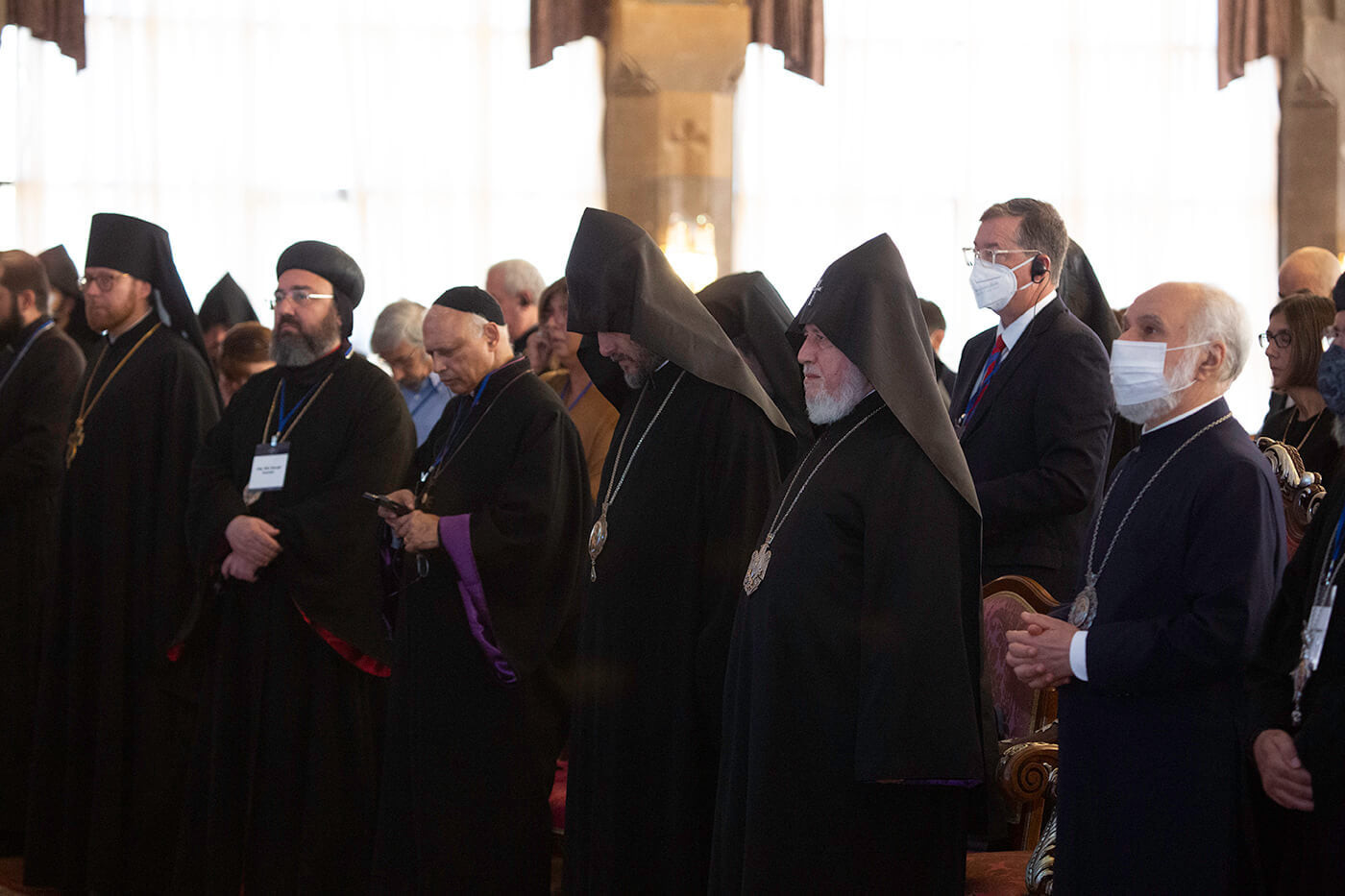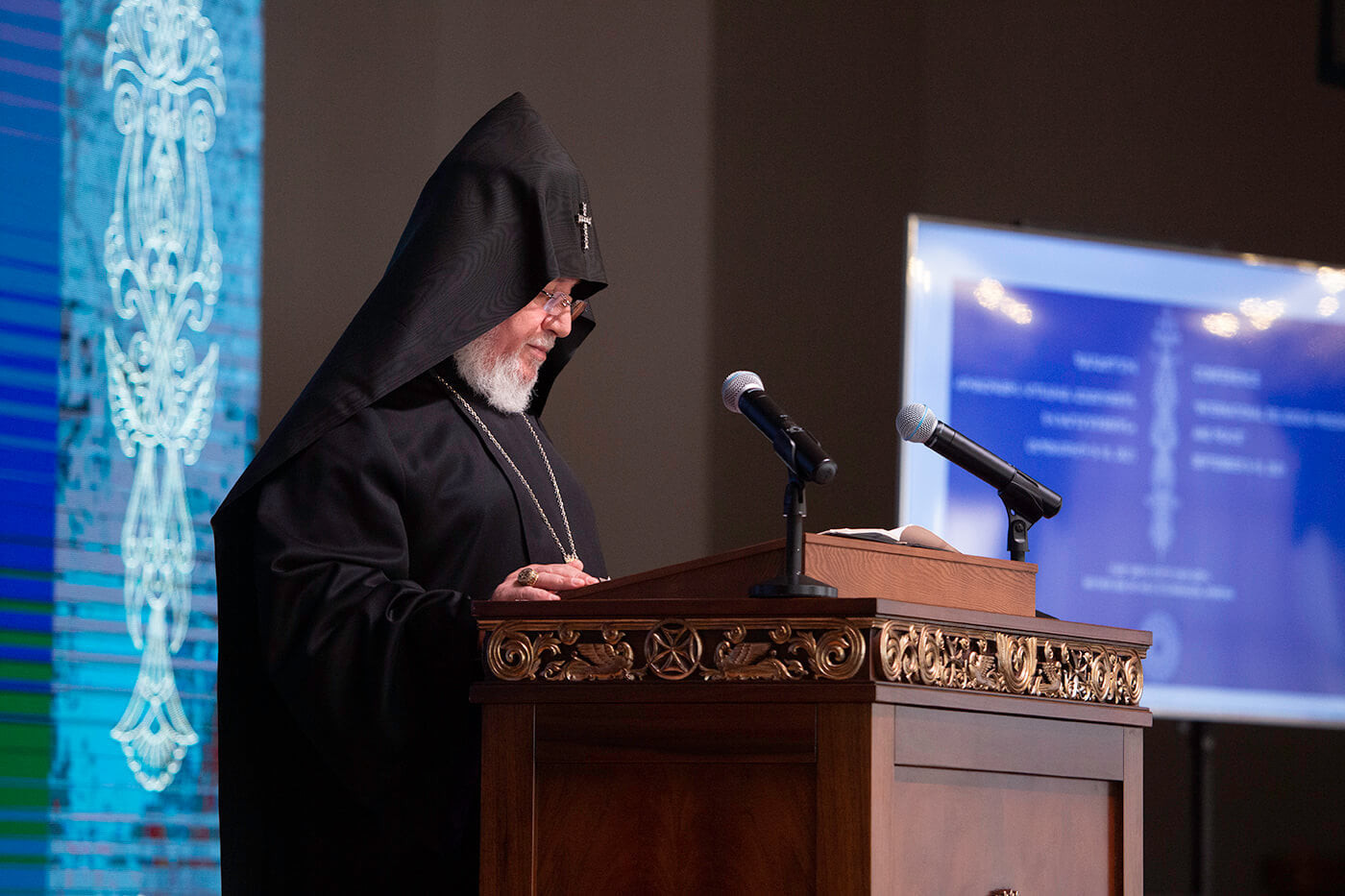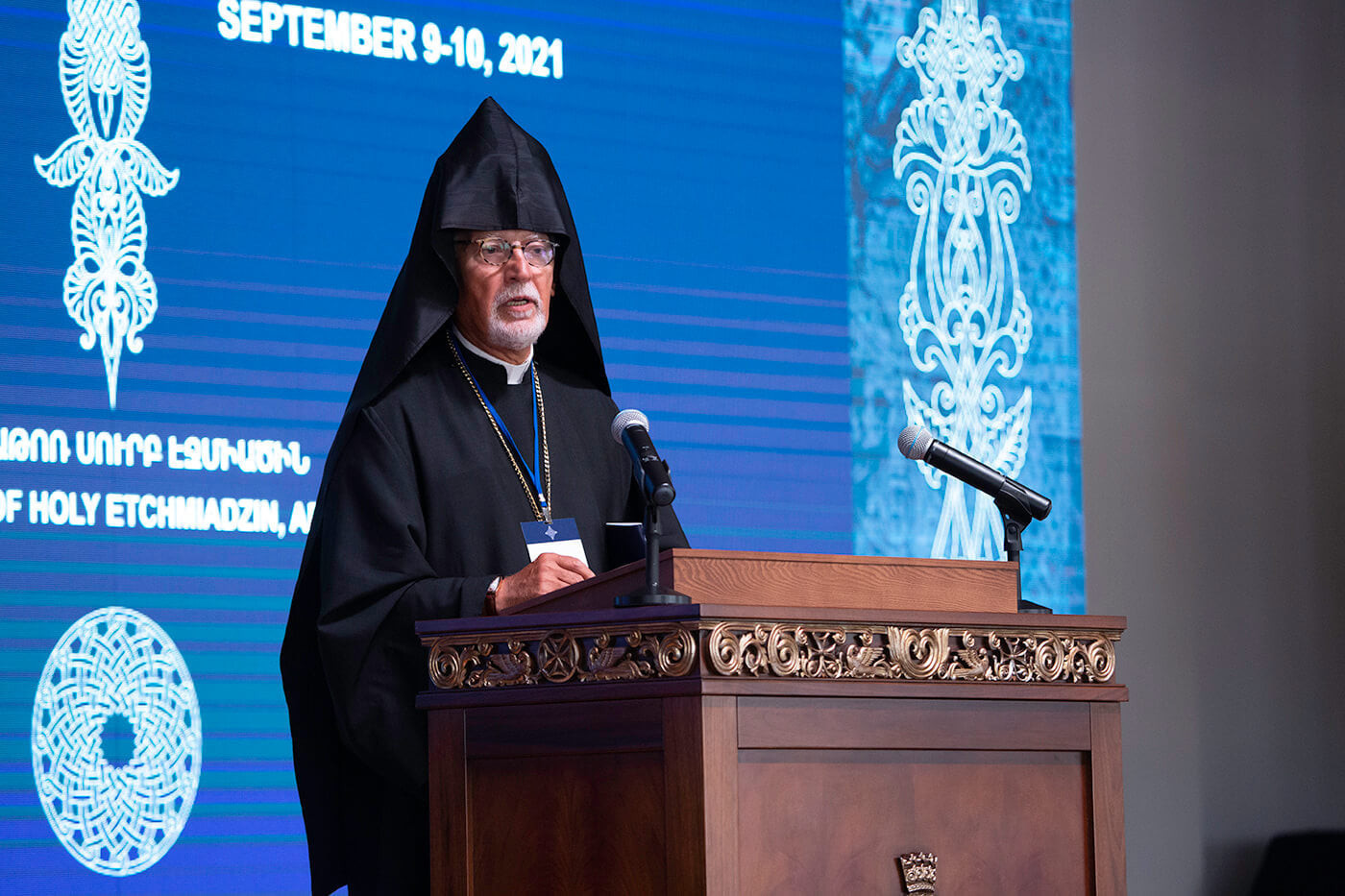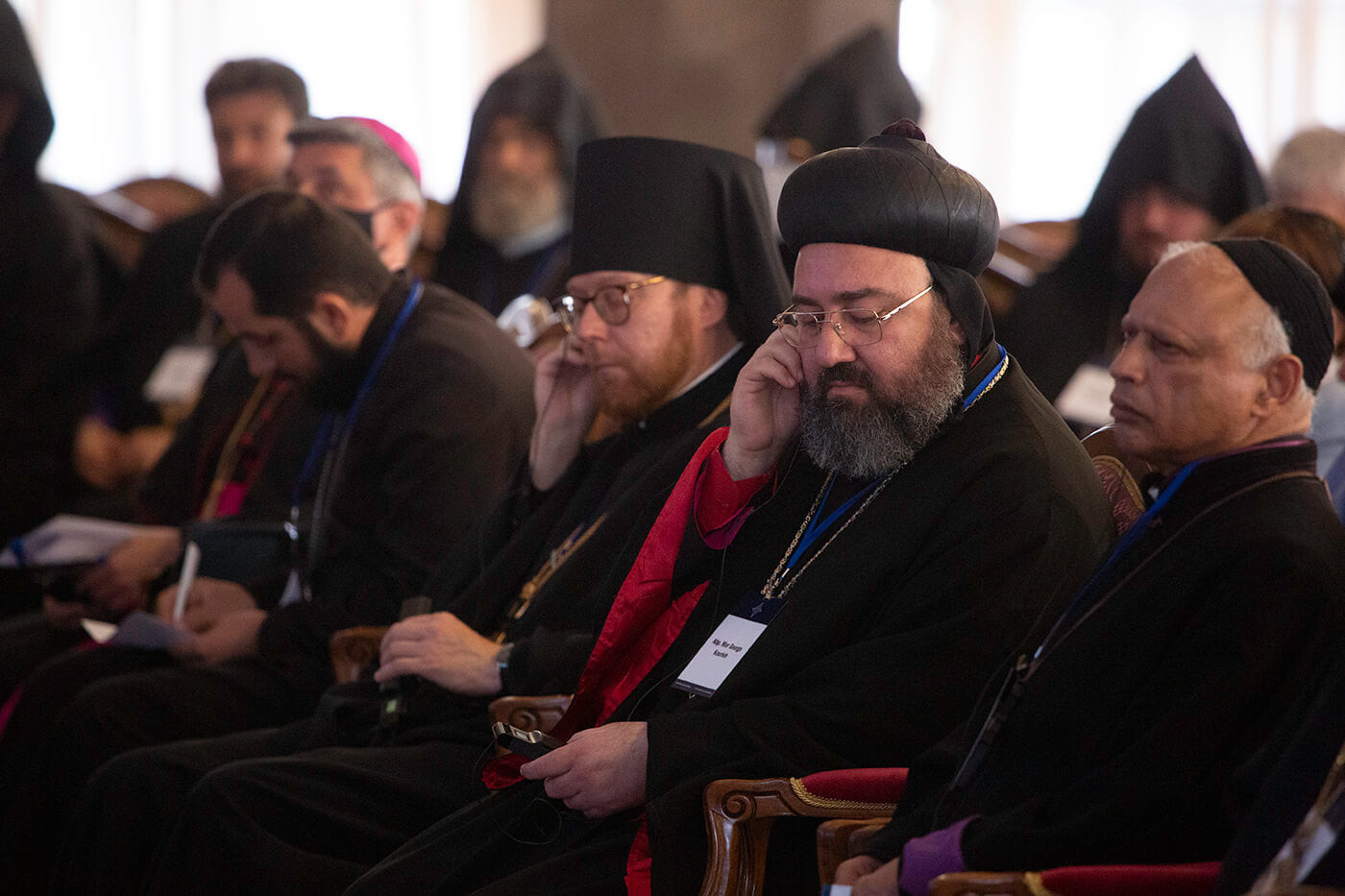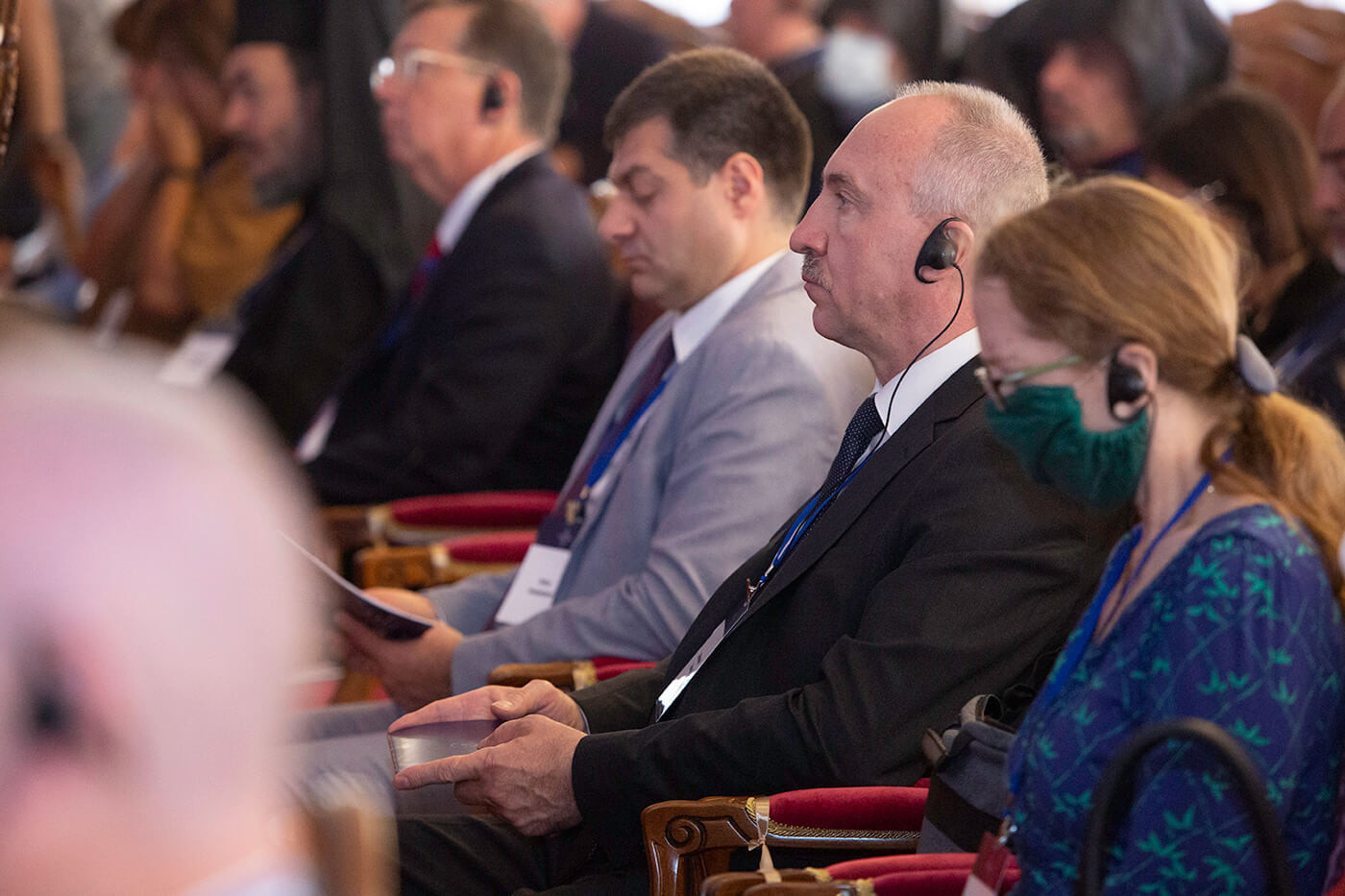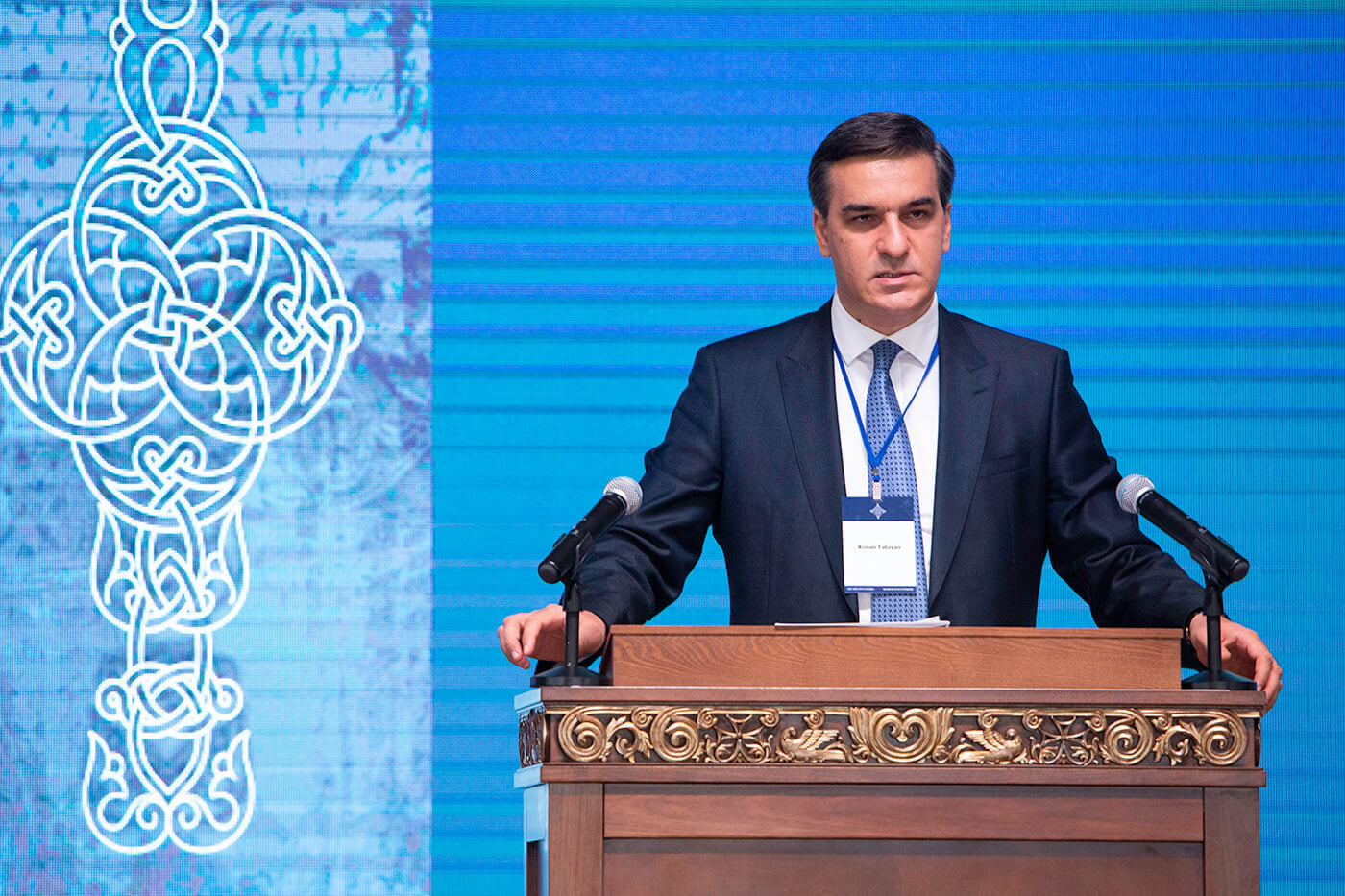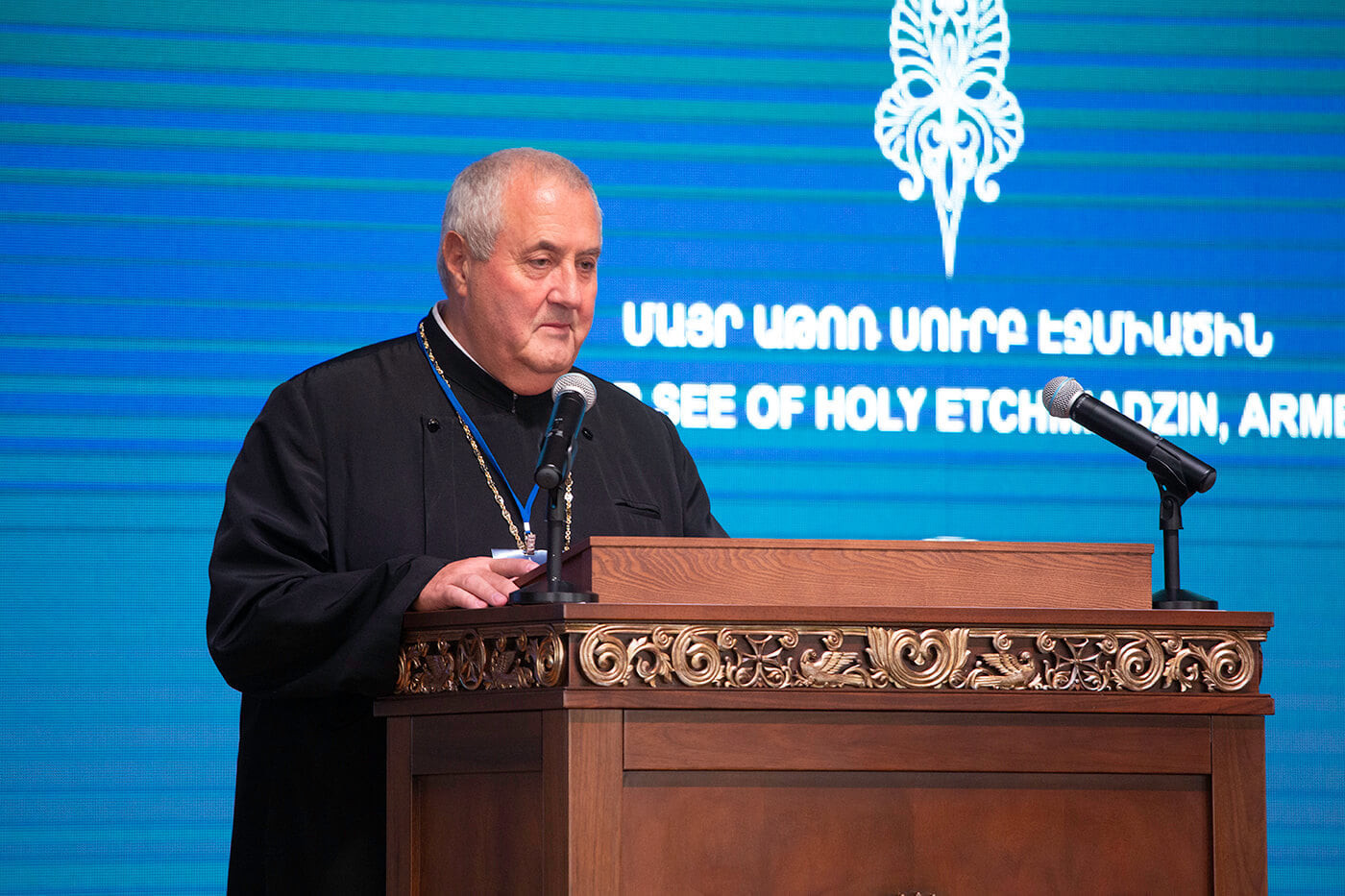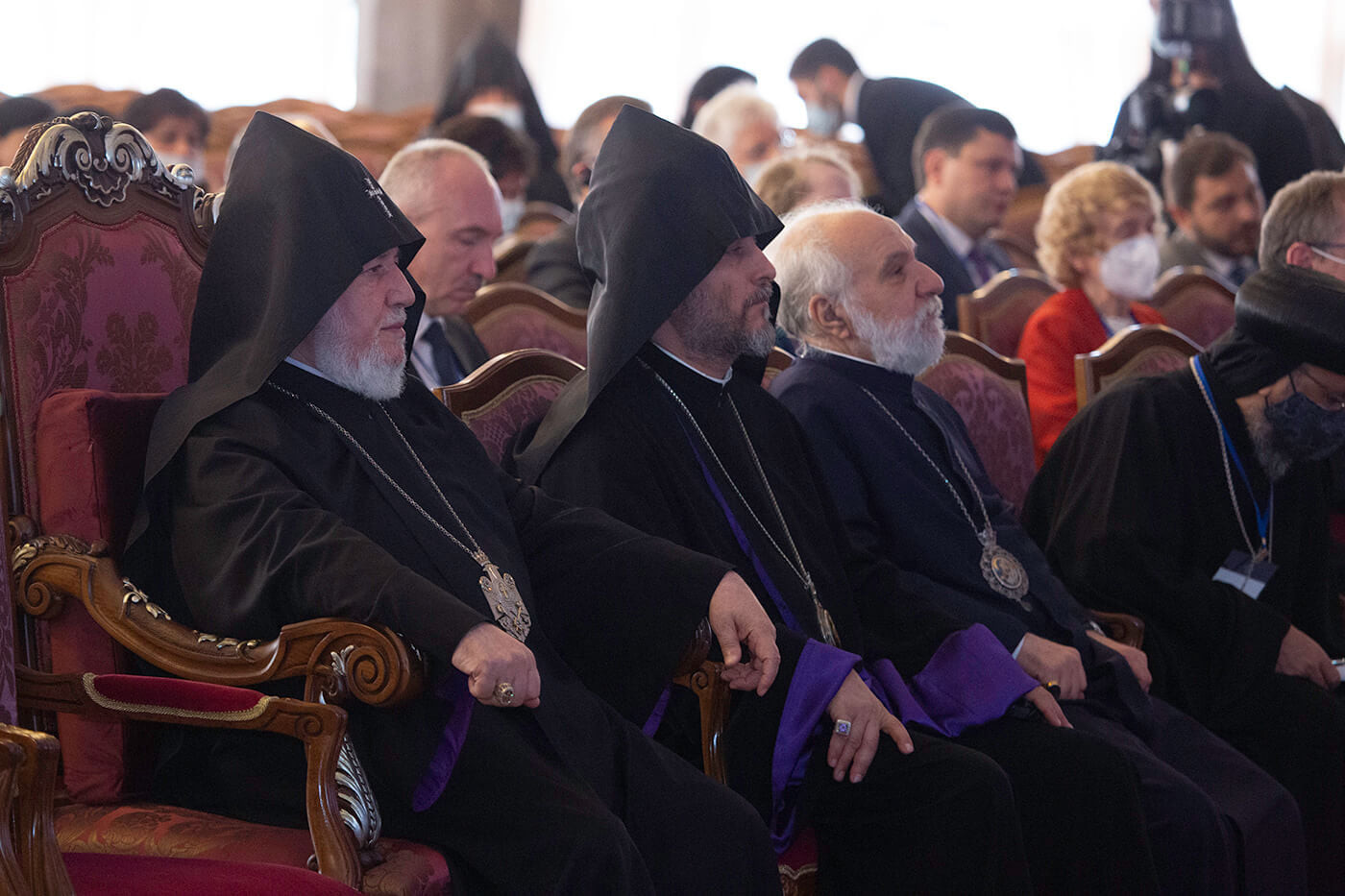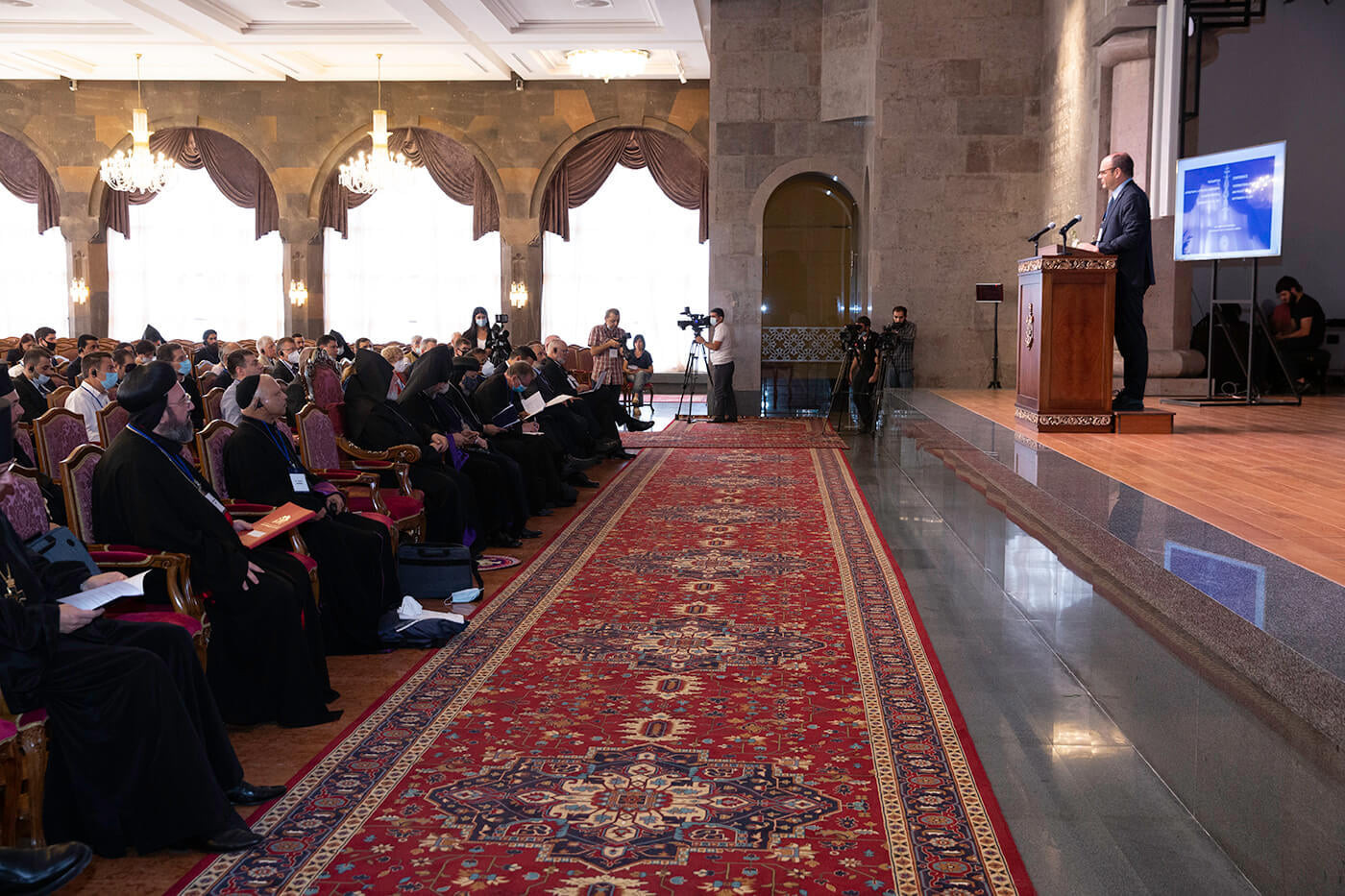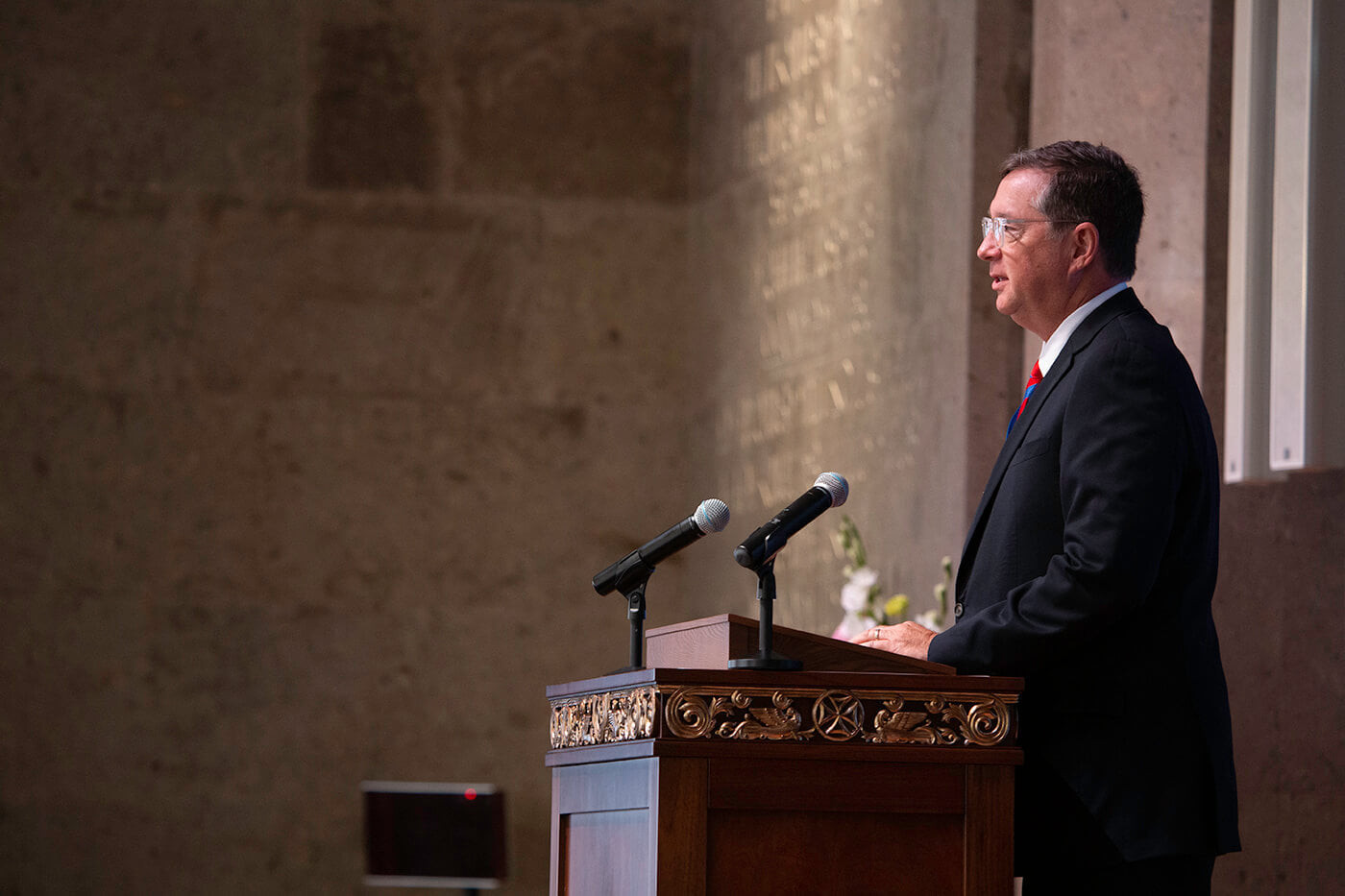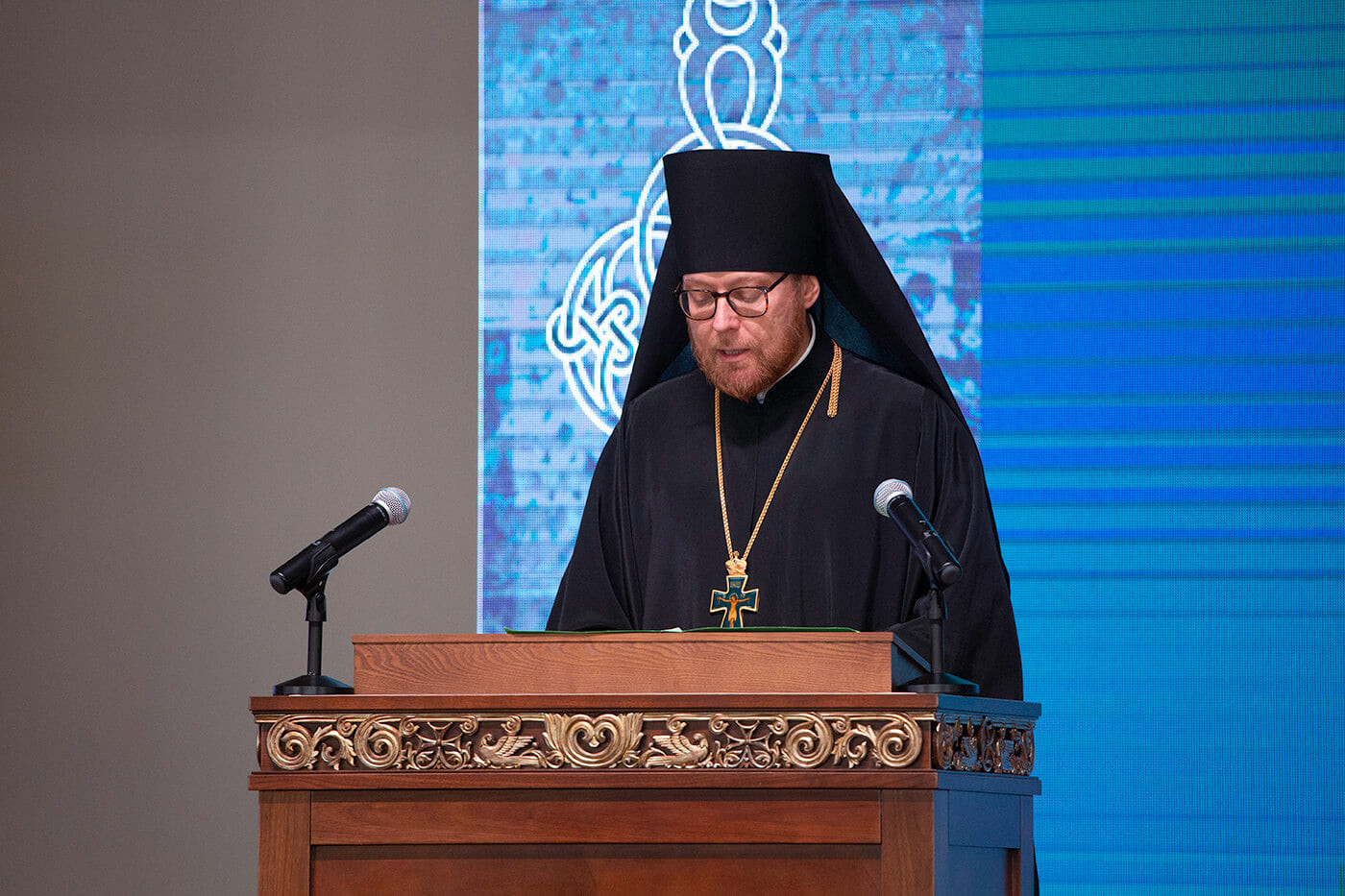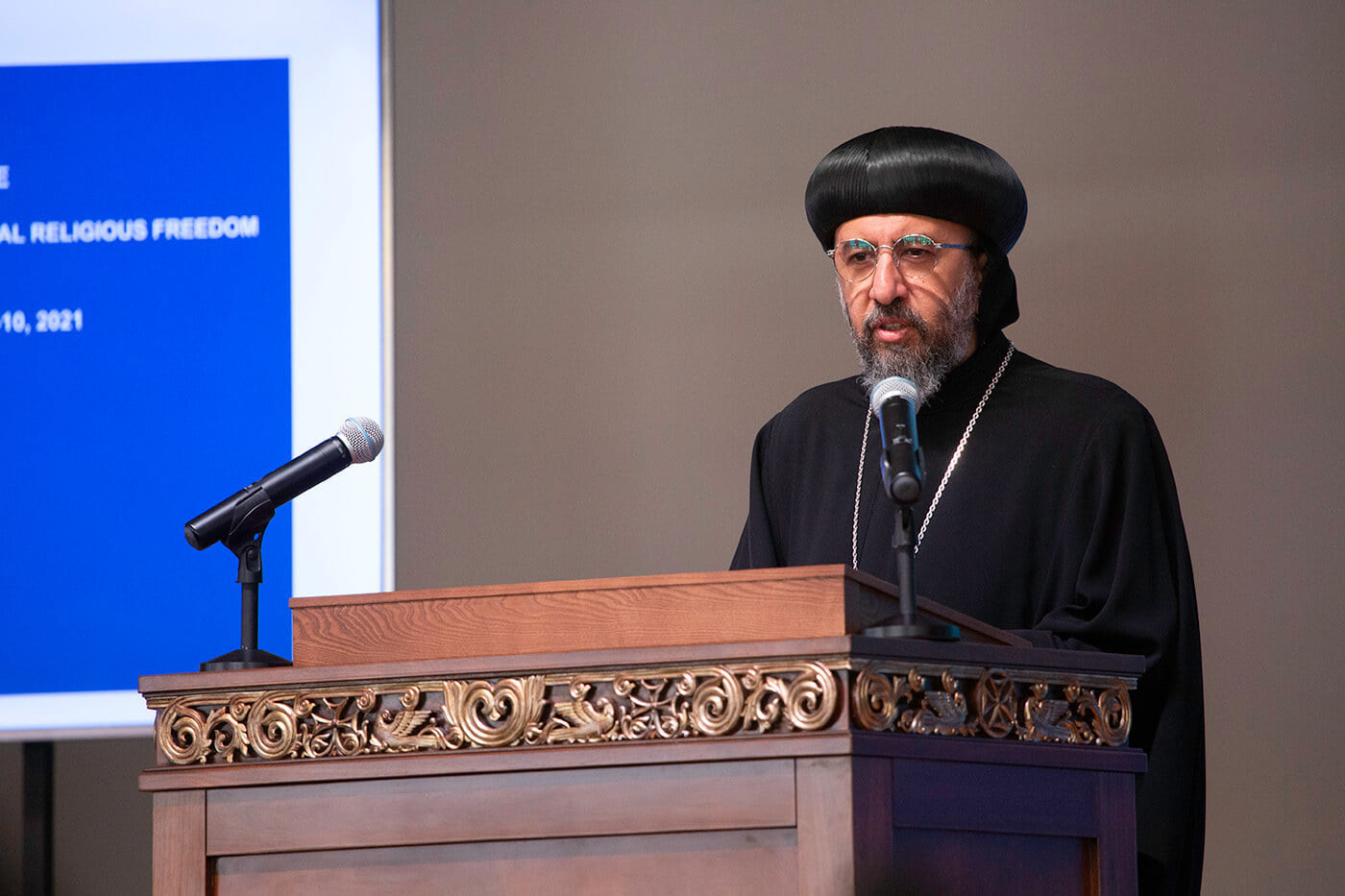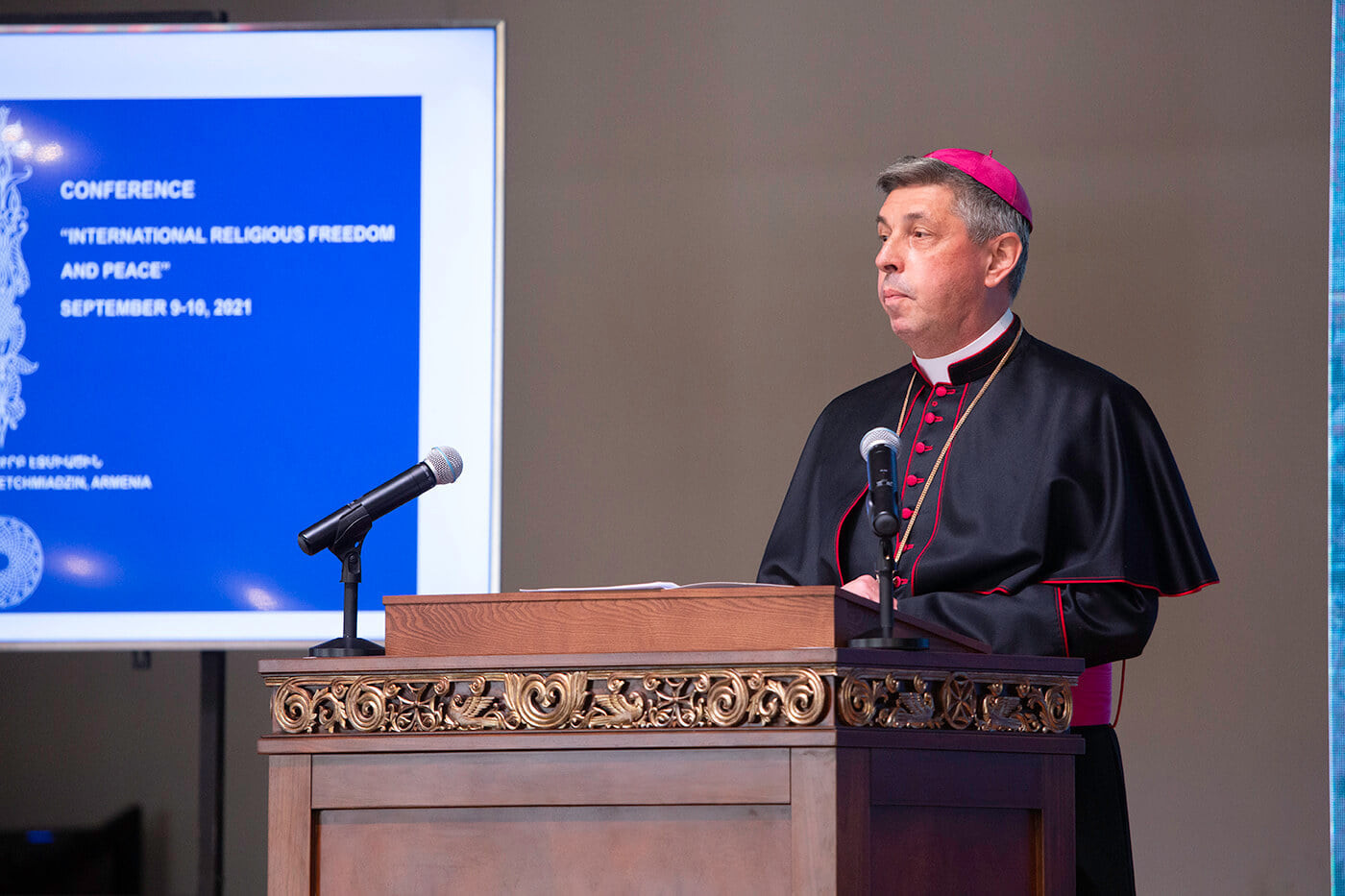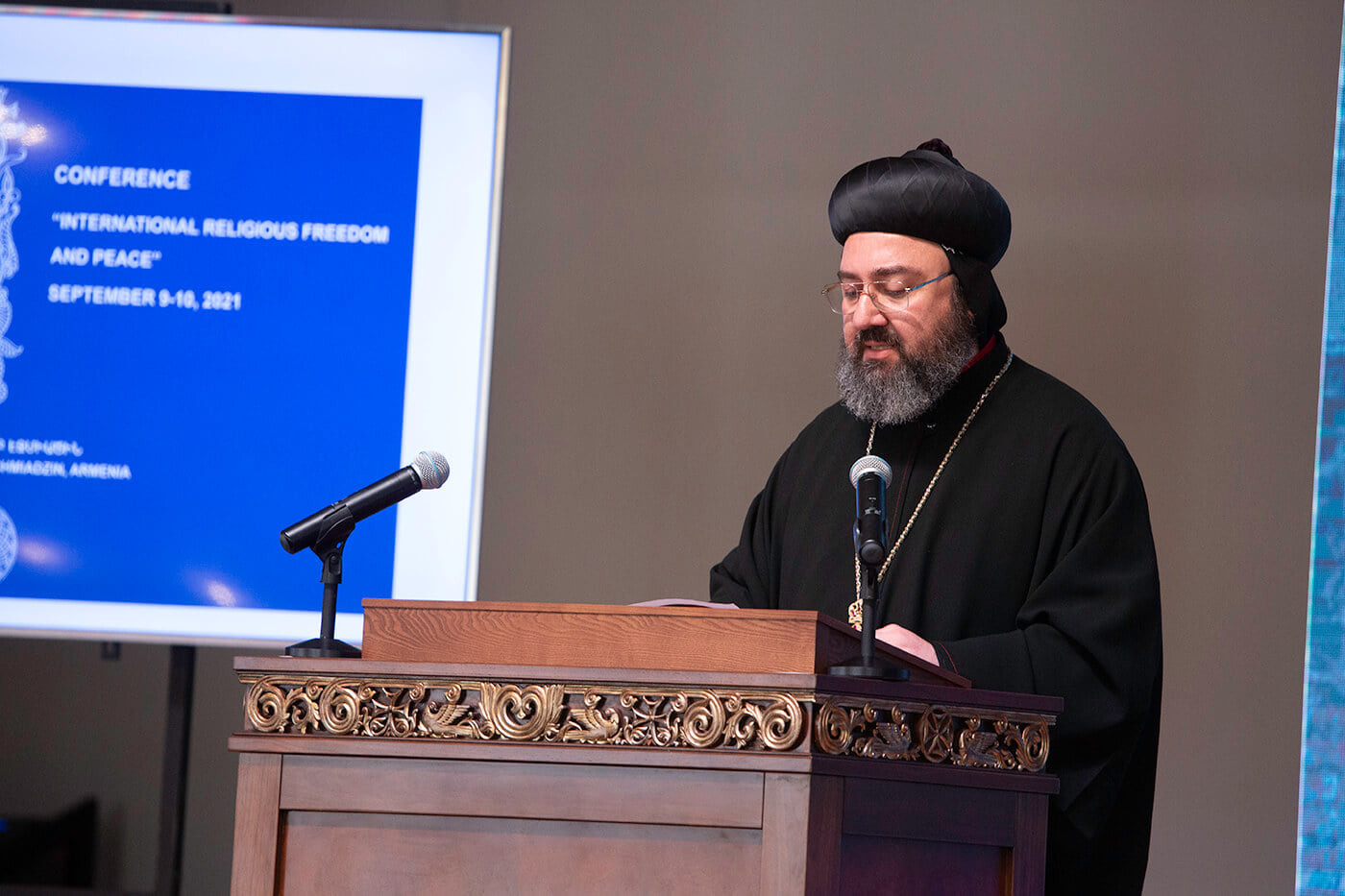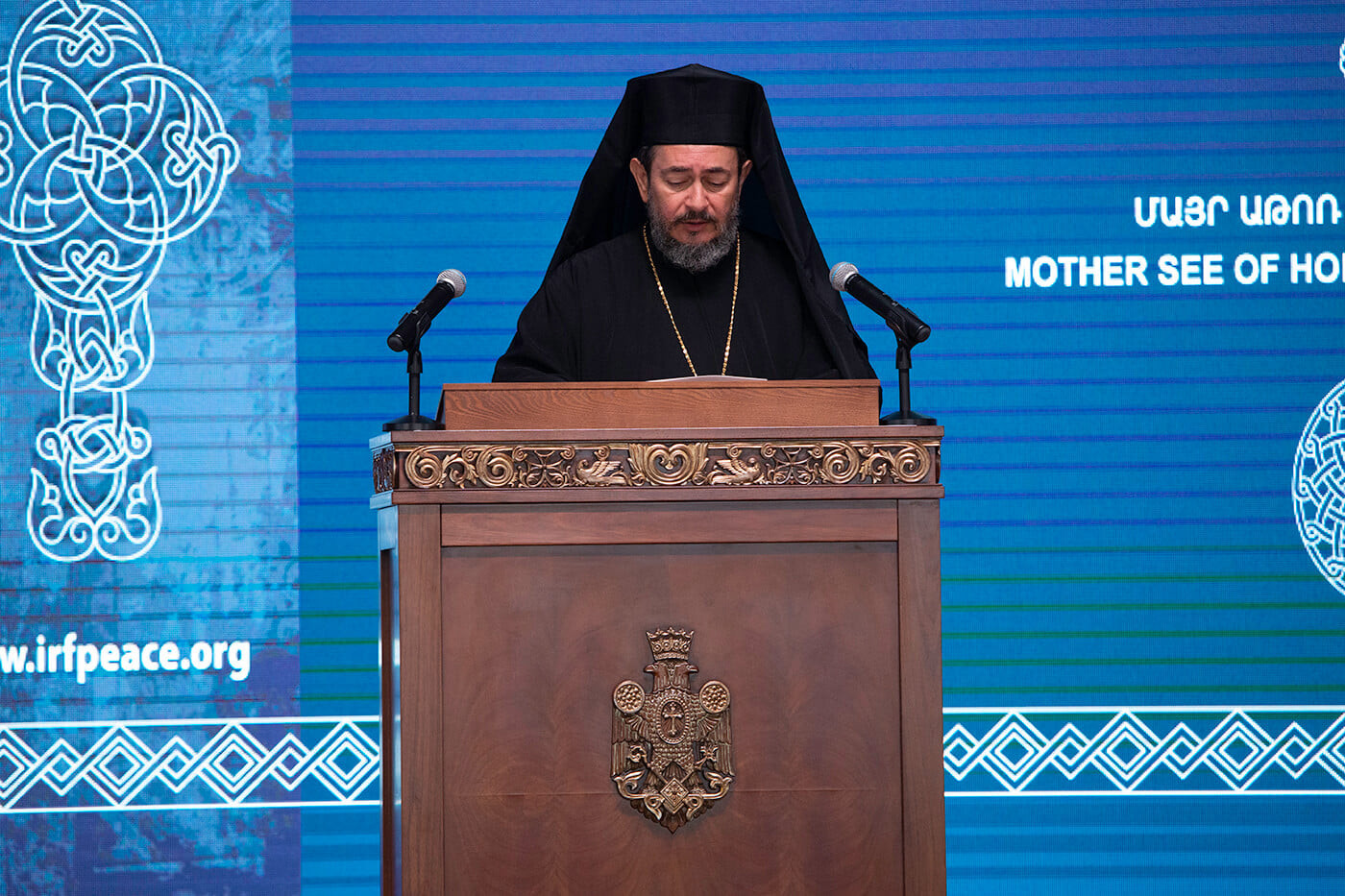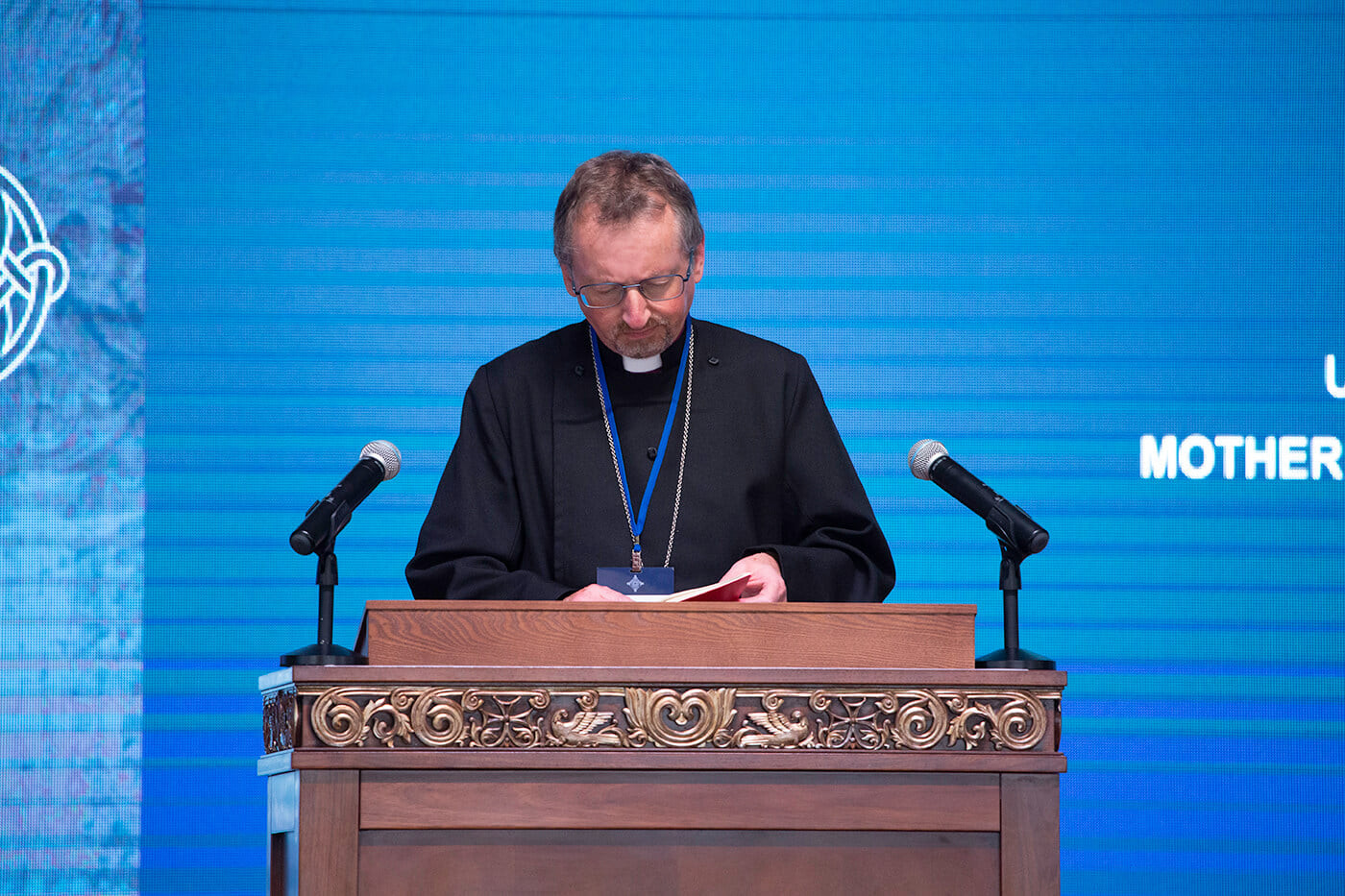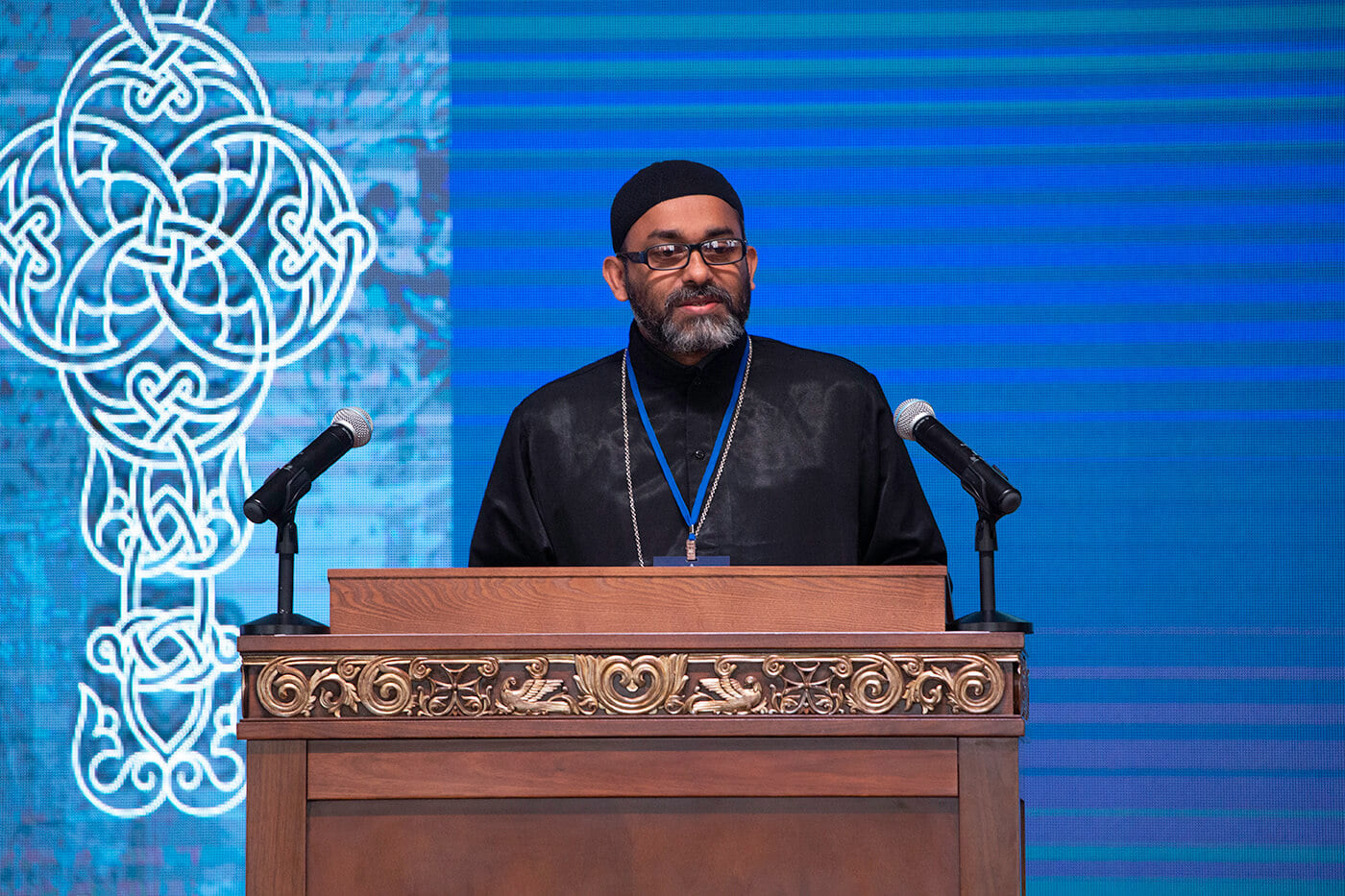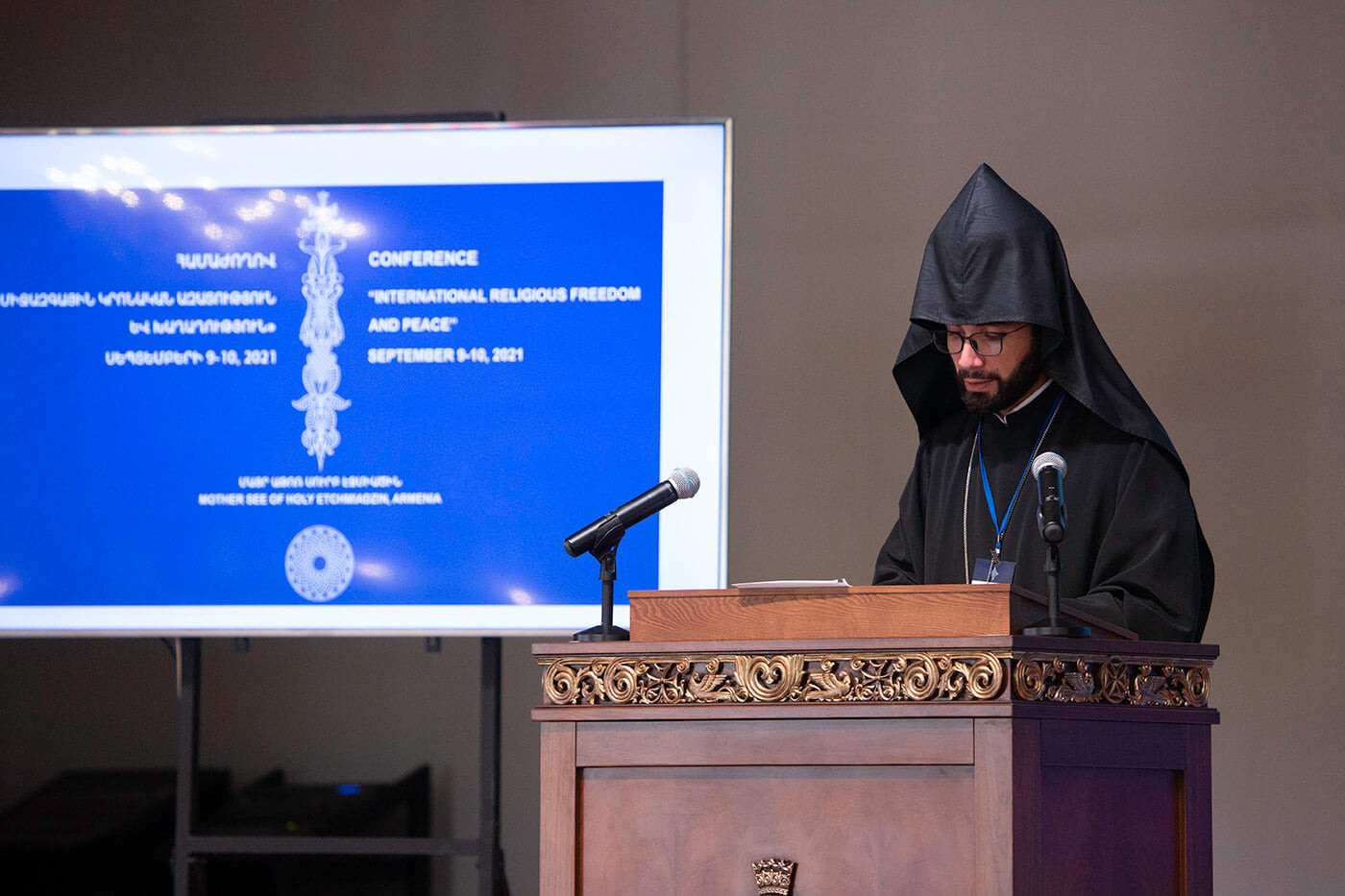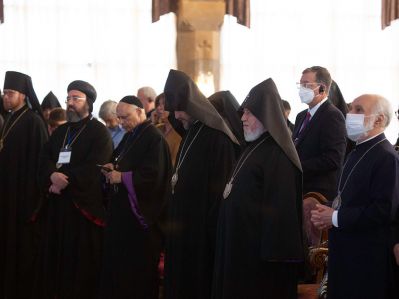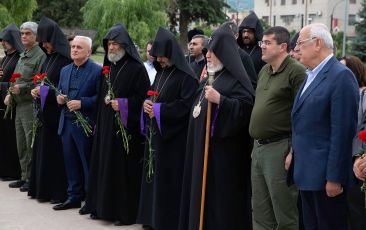Mother See օf Holy Etchmiadzin holds the two-day conference on “International religious freedom and peace”
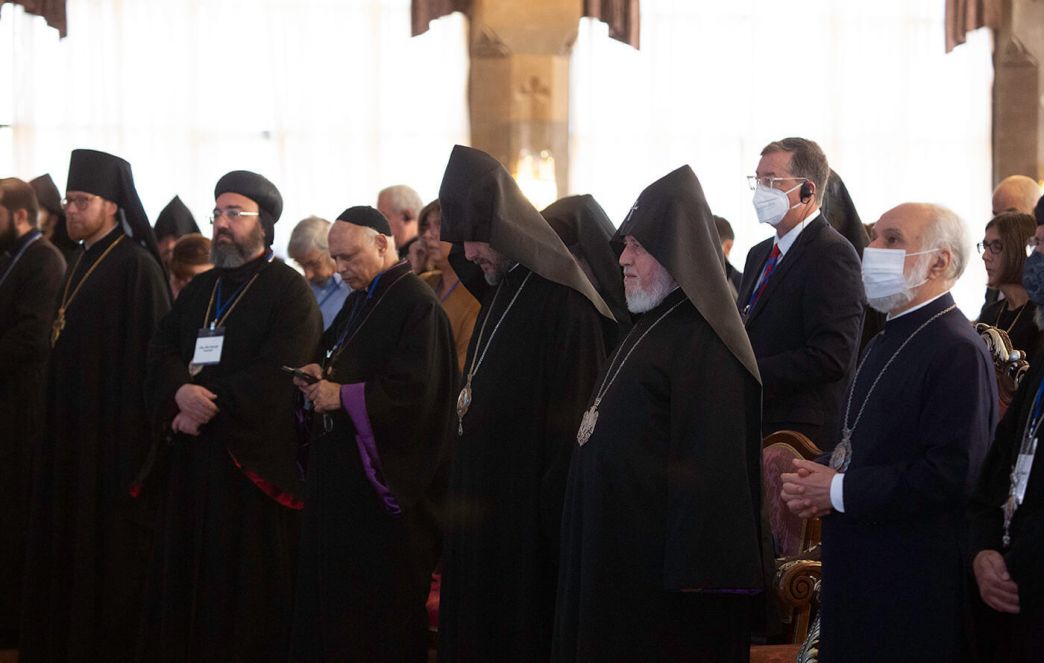 09.09.2021
09.09.2021
On September 09, in the Great Hall of the Pontifical Residence of the Mother See of Holy Etchmiadzin, with the Blessings of His Holiness Karekin II, Supreme Patriarch and Catholicos of All Armenians; and through the initiative of the Mission Department of the Mother See and the Committee for the Preservation of Spiritual-Cultural Heritage of Artsakh, the two-day international conference entitled “International Religious Freedom and Peace” was convened.
The Conference was attended by the members of the Brotherhood of the Mother See, representatives of the Sister Churches and Christian organizations, scientists and public figures from different countries.
At the beginning of the conference, His Eminence Archbishop Vicken Aykazian, Chairman of the Committee of Artsakh Cultural-Spiritual Heritage, asked the attendees to hold a minute of silence in remembrance of the innocent victims of the 44-day War of Artsakh. Then, His Holiness Karekin II, Supreme Patriarch and Catholicos of All Armenians; conveyed His Message and Blessings to the participants of the Conference.
“Your Eminences, Your Graces, Reverend Fathers, honorable ladies and gentlemen,
We are delighted to welcome you here to the spiritual Center of all Armenians in the Mother See of Holy Etchmiadzin. We bring our Pontifical Blessing on this conference entitled "International Religious Freedom and Peace".
The efforts of the office and the committee for Artsakh spiritual cultural heritage issues, located at the Mother See of Holy Etchmiadzin, are highly commendable. We appreciate the efforts of the team to unite the devotees who bring their service to the world for the noble ideas of freedom and peace. Their joint efforts will greatly contribute to the revitalization and strengthening of those ideas.
The concepts of freedom and peace are as old as the history of mankind itself and yet they continue to be relevant today. This is especially true while the existence of violence, conflicts, and wars in different parts of the world is often unjustified under the false agendas of freedom and peace.
According to Christian thinking, freedom is manifested in the harmony of the human will with the will of the Most High. It is with this conviction that the apostle Paul declares: ,Where the Spirit of the Lord is, there is freedomե (2 Corinthians 3:17). Indeed, without a sublime religious understanding of the concepts of freedom and peace, it is impossible to achieve a comprehensive understanding and implementation of human freedoms and rights.
In the secular sense, freedom is interpreted as the right to express a person’s will and to act freely, excluding harm caused to others and limiting the freedom of others.
The interpretations of the concept of freedom, regardless of what foundation they are built on, should be unquestionably called upon to serve and ensure the harmonious and peaceful coexistence of mankind, towards the fulfillment of the biblical message of ,peace on earth, and good will toward menե (Luke 2:14).
In this sense, we would like to voice the words of the late Catholicos of all Armenians, Vazgen the 1st about peace, ,One can disagree and argue about everything. The imperative of peace, however, must be above all disputes, it must become the supreme rule of thought and action for all”.
Our mission as clergymen, should be to pray to God with all our strength, from the depths of our souls, to work with undiminishing zeal to strengthen our moral power ever more, so that peaceful relations are established between nations and states on the path leading to the solution of all other issues.
Beloved, God՚s blessing, advancement in life, and joy are found only in peace. Hope of the future is also in peace. For us Christians to call for peace and to establish peace means to testify of Christ. The message of our Lord and Savior is, "Make peace with one another" (Mark 9:49). Indeed, our steps toward peace are an expression of our faith in God, for faith itself is a covenant of peace with God.
Peace can bear fruit and persist only by the application of justice. Forced peace, without justice, breeds pain and suffering instead of good. It also breeds hatred and enmity in human life. Despite the universal awareness and aspiration of the need for freedom and peace, violence, wars, ethnic hatred, enmity within nations and world-wide crimes based on them have not been yet overcome in the world to this day. Moreover, such actions continue to be carried out using the latest modern scientific and advanced technological achievements.
Mankind has often faced expressions of hatred and intolerance against freedom and peace of individuals and nations. Throughout its history, our people also have suffered the consequences of gross violations of freedom and ethnic hatred.
Such tragic events took place in the life of our people at the beginning of the 20th century, when one and a half million Armenians fell victim to the Genocide in the Ottoman Empire. The Armenian people suffered severe grief, while losing their historical homeland as well.
The indifference towards the first genocide throughout the history of mankind, the delay in the application of legal measures led to other genocides, crimes against humanity, the tragic consequences of which were the Holocaust in the middle of the last century, and the genocides of Cambodia, Rwanda, Darfur and elsewhere in the late 20th century.
Quite recently we faced such painful events, a large-scale war was waged by Azerbaijan against our people living in Artsakh. During the military offensive, in which Turkish military forces and international mercenaries were involved, phosphorous munitions and other kinds of forbidden weapons were used also against peaceful settlements and people. Thousands of people died and became disabled as a result of these tragic events, settlements were destroyed, tens of thousands of families became refugees. Many, both from the military and peaceful civilians, were also taken captive even after the hostilities and to this day, they are kept under cruel conditions in Azerbaijan, with gross violations of international humanitarian law.
We would like to once again express our appreciation and gratitude to all international, humanitarian, ecclesiastical and inter-church organizations and to all of you present here today for the efforts towards the release of the Armenian prisoners of war and for the preservation of the religious and cultural values.
The bombing and destruction of sanctuaries during the war, and continuing even after the war, testify to Azerbaijan՚s policy of erasing all Armenian traces from Artsakh, as also happened in 2003. More than 6,000 cross stones -khachkars were completely destroyed in the Armenian cemetery in Jugha, the area was transformed into a shooting range. Memories are still fresh of the destruction of cultural monuments as a result of the hostilities in Afghanistan, Iraq, Syria, and Egypt in recent decades.
In this regard, the concerted efforts of the international community and relevant organizations are essential to prevent the cultural genocide and ensure the protection of religious and cultural monuments. It is imperative that the UNESCO expert mission assesses the condition of the Armenian cultural heritage sites in the territories under the control of Azerbaijan, which Azerbaijan obstructes in every way.
In addition, it should be noted that with the efforts of the Patriarch Cirill of Moscow and All Russia, the President of the Russian Federation, Mr. Vladimir Putin, the Russian peacekeeping forces, it was possible to ensure the vital activity of our ancient historical sanctuary of Dadivank where currently serve six Armenian clergymen.
Beloved, the Armenian nation and the Armenian church has lived and continues to live in almost each and every continent of the world and in the most diverse religious cultural environments. This is due in part to historical circumstances and especially the Armenian genocide. Armenians live in peaceful coexistence with Islamic, Buddhist, Hindu, Jewish, and Christian denominations, bearing the exemplary witness of a dialogue among the religions of the world and peaceful coexistence. Today as well, freedom of religion is a supreme principle. It is guaranteed by and is ratified in many international declarations, decrees, constitutions of democratic countries, and laws.
The concept of freedom of religion is so very often abused under the umbrella of religious freedom, veiled under universal values of thought, conscience and religious freedom. It is obvious that under the veil of the right to freedom of religion, modern religious totalitarian organizations are being formed. They distort the mental and spiritual state of people, conduct destructive activities, causing division among families and within the life of societies. They sow enmity towards traditional religious structures.
In this matter also, all possible efforts must be made to ensure that the concept of religious freedom does not become a stumbling block to cause evil, on the contrary may it serve the well-being of people, societies and nations, serve as a foundation for a bright future, and strengthen the brotherhood among churches and the spirit of collaboration which has been on a rise for more than half a century. May it serve to the universal Christian witness all around the world.
Esteemed members of the conference, we lift our prayers to God once again and bestow our blessing upon you here at the Mother see of Holy Etchmiadzin. We wish that the speeches and fruitful discussions presented by religious leaders, clergymen, leading scientists, and experts will contribute toward the establishment of freedom and peace in our world. We beseech the Lord so that the Holy Spirit may guide you and wish an efficient course to the conference”.
Fr. Ioan Sauca, Acting General Secretary of World Council of Churches; Rev. Fr. Christian Krieger, President of the Conference of European Churches; Mr. Jim Wrinkler, General Secretary and President of the National Council of Churches, USA; His Eminence Archbishop Angaelos, Primate of the Coptic Orthodox Diocese of London; His Eminence Archbishop Mor George Kourieh, Patriarchal Vicar in Belgium, France and Luxembourg of the Syriac Orthodox Church; the Right Rev. Robert Innes, Bishop of Gibraltar in Europe of the Churches of England; Fr. Abraham Thomas, Secretary to the Department of Ecumenical Relations of Malankara Orthodox Syrian Church of India; delivered their welcoming messages to those attendees; His Eminence Archbishop Jose Avelino Bettencourt, Apostolic Nuncio to Armenia; conveyed the message of Pope Francis of the Roman Catholic Church; Fr. Philaret Bulekov, Vice-Chairman of the Department of External Church Relations of the Patriarchate of Moscow of the Russian Orthodox Church, conveyed the message of Metropolitan Hilarion, Head of the same Department; Fr. Nikademus Yokhanaev, Priest of the Assyrian Community of Armenia, conveyed the message of His Holiness Mar Gewargis III, Catholicos–Patriarch of the Assyrian Church of the East.
Then, Mr. Arman Tatoyan, Human Rights defender of Armenia, delivered a lecture. In his speech, reflecting on the current issues of freedom of religion, conscience and thought, Mr. Arman Tatoyan, based on the facts obtained, stated that the rights and religious feelings of the Armenian prisoners of war who were taken captive by Azerbaijan during the recent War of Artsakh, are regularly violated; as well as the Armenian spiritual and cultural heritage that is under the control of Azerbaijan, is constantly being violated. The Human Rights Defender qualified such behavior adopted by Azerbaijan as a genocidal policy.
Mr. Tatoyan also greatly emphasized the importance of the role of the Armenian Church and international Christian organizations in the protection of human rights, as well as in the preservation of spiritual and cultural values.
Then, reports were presented by Fr. Ioan Sauca, Acting General Secretary of the World Council of Churches (“Promoting peace and religious freedom through protection of religious and cultural heritage”); Mr. Jim Winkler, General Secretary and President of the National Council of Churches, USA (“The need for cooperation in defending religious freedom and faith”); the Baronnes Cox of Queensbury, Independent Member of the House of Lords, UK (“The Pain and the Passion: The Privilege of Making a Difference”); His Eminence Archbishop Angaelos, Primate of the Coptic Orthodox Diocese of London (“The necessity of collaboration to protect religious freedom and belief”); Mr. Yeghishe Kirakosyan, Representative of the Republic of Armenia before the European Court of Human Rights (“The Protection of Armenian Cultural and Historic Heritage under the European Convention of Human Rights”); Dr. John Eibner, President of the Christian Solidarity International (“Religious Cleansing in Progress; Beyond the Armenian Genocide in Space and Time”); Ms. Sheila Paylan, Human Rights Officer (“The Responsibility to Protect Cultural Heritage and Prevent or Punish Cultural Genocide under International Law”); Dr. Heghnar Watenpaugh, Professor of Art and Art History of the University of California (“Cultural Heritage, Religious Heritage, and Human Rights”); Very Rev. Cor Episcopos Patrick Sookhdeo, International Director of Barnabas Fund (“Religious Extrimism: Impact on the World”)
Discussions followed the reports.
At the end of the first day of the international conference, the Catholicos of All Armenians hosted the heads of the church structures and the clergy representatives of the churches.
See the related photos
